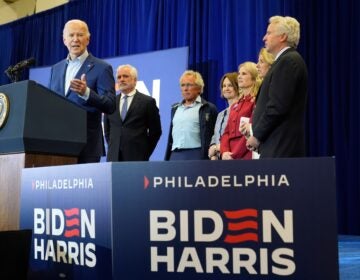Cheers, vows to ‘keep fighting’ as thousands of area immigrants may gain temporary status
President Barack Obama’s actions expanding temporary legal status to certain immigrants could change the lives of thousands across the Philadelphia region.
Christina Nodal, a short, smiling women with salt and pepper hair, is one of those now eligible for temporary legal status under the Obama administration’s expansion of “deferred action” programs.
Prioritizing “deporting felons not families,” the amplified programs defer deportation and authorize employment for people who meet certain criteria, namely living in the U.S. for more than five years and having family members with permanent legal status.
A mother of four, including two U.S. citizens, Nodal now qualifies for two or three years of legal status if she completes the forthcoming paperwork.
Nodal, who arrived in the United States from Mexico decades ago, said she would like to use the opportunity to get a better job and continue studying English.
“Twenty-three years I’m here, undocumented,” she said Friday, a day after the president’s announcement. “This is something very happy for me.”
As news about the expansion rolled out over television screens last night, some immigrant advocacy groups in the region gathered to watch and digest the news and share their reactions. Others prepared for the work ahead in making sure that those who are eligible under the expanded programs get the right information.
In the West Kensington neighborhood of Philadelphia, representatives from the Pennsylvania Immigration and Citizenship Coalition (PICC) and New Sanctuary Movement gathered around Angela Navarro, currently seeking sanctuary from a deportation order, to listen to the president’s speech.
Some wanted more details.
“The president wasn’t really clear. He talked about sending DACA (Deferred Action for Child Arrivals) to parents [of U.S. citizens], but he didn’t say anything about the parents who have children who have DACA,” said Selena Mercado, who lives in Drexel Hill.
Mercado has DACA, which gives her two years of legal status while she finishes a degree in early childhood education from Delaware County Community College. Her parents, however, will remain undocumented even under the changes.
“I don’t think it’s fair for people who have been here a long time,” said Mercado. “For example my father, he’s been here 12 years.”
Other groups were preparing for action.
Amanda Bergson-Shilcock, the vice president of policy and evaluation at the Welcoming Center for New Pennsylvanians, said that any change in immigration policy sparks a wave of immigration law fraud.
“The most important thing we wil be doing over the news few months is getting accurate information out to people and preventing bad information and scams,” she said.
Implementation can vary at the local level, she said, so advocacy groups sometimes work with enforcement agencies to urge leniency.
In front the Immigration and Customs Enforcement building in Philadelphia, members of the advocacy group Juntos gathered Friday to “chant down the walls” and share a message of solidarity with immigrants detained inside.
Protesters vowed to “keep fighting,” chanting “Si se puede,” or “yes, we can.”
The policy changes will be implemented by U.S. Citizenship and Immigration Services, which announced on its website that “some will be implemented over the next several months and some will take longer.” The president is not able to change access to permanent legal status – only Congress has that power.
Still, these changes will affect a lot of people. Estimates from the Migration Policy Institute in Washington, D.C., put the number of people across the region who could be eligible for action at up to 55,000 in Pennsylvania, 67,000 in New Jersey, and 11,000 in Delaware.
WHYY is your source for fact-based, in-depth journalism and information. As a nonprofit organization, we rely on financial support from readers like you. Please give today.














